RICHARD’S WEEKEND MOVIE REVIEWS FROM CP24! FRIDAY NOVEMBER 21, 2014.
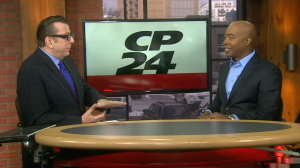 Richard’s CP24 reviews for “The Hunger Games: MockingJay – Part 1″ and “The Homesman.”
Richard’s CP24 reviews for “The Hunger Games: MockingJay – Part 1″ and “The Homesman.”
Watch the whole thing HERE!
 Richard’s CP24 reviews for “The Hunger Games: MockingJay – Part 1″ and “The Homesman.”
Richard’s CP24 reviews for “The Hunger Games: MockingJay – Part 1″ and “The Homesman.”
Watch the whole thing HERE!
 Richard’s “Canada AM” reviews for “The Hunger Games: MockingJay – Part 1” and “The Homesman.”
Richard’s “Canada AM” reviews for “The Hunger Games: MockingJay – Part 1” and “The Homesman.”
Watch the whole thing HERE!
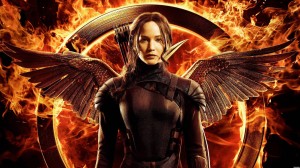 “Everything old can be made new again,” says tribute escort Effie Trinket (Elizabeth Banks) in “The Hunger Games: MockingJay – Part 1,” “even democracy.” So, apparently, is the “Harry Potter” model of cleaving the final book in a popular series into two moneymaking movies.
“Everything old can be made new again,” says tribute escort Effie Trinket (Elizabeth Banks) in “The Hunger Games: MockingJay – Part 1,” “even democracy.” So, apparently, is the “Harry Potter” model of cleaving the final book in a popular series into two moneymaking movies.
A better, catchier title for the third part of the Hunger Games tetralogy might be “You Say You Want a Revolution.” “MockingJay – Part 1” takes the action off the playing field and into the realm of rebellion.
With one arrow Katniss Everdeen (Jennifer Lawrence) changed the barbaric Hunger Games forever, opening the door to rebellion. In the surrounding turmoil, her love Peeta (Josh Hutcherson), was left behind in the Capitol and has become a pawn in the propaganda game being played by the totalitarian President Snow (Donald Sutherland) and District 13 rebel leader Alma Coin (Julianne Moore). The revolution to unify the districts against the capitol has begun with Katniss cast as the MockingJay, a reluctant hero but a symbol of hope to the oppressed masses.
“The Hunger Games: MockingJay – Part 1” ups the stakes considerably from the last film, putting several big ideas into motion. The cinematic world created in the first two movies is about to change in very dramatic ways and this movie prepares viewers for the revolution. Katniss looks suitably concerned throughout and there are several effectively staged action scenes, but despite the fine performances and lessons in mass produced anarchy, it’s hard to shake the feeling that this is a place holder for next year’s series finale.
Scenes stating the obvious—“He’s punishing me because I’m the MockingJay!” Katniss reveals in one, “Duh, yeah” scene—feel added in to stretch the movie to its two hour running time.
That’s not to say there isn’t entertainment value here. Far from it. Lawrence takes a role that could have been buried under layers of teen ennui or steely-eyed determination and gives Katniss some real depth and it is a blast to see Moore and Seymour-Hoffman back on screen together again. Sutherland is at his serpentine best and Harrelson and Banks struggle with their new surroundings in entertaining ways; he with sobriety, her with a lack of haute couture.
Most entertaining is the film’s take on the building of a social movement. Katniss is manufactured into the people’s hero. She’s given line readings and a fan to blow her hair around in sexy and stirring propaganda videos and dressed in stylish warrior gear. “Everyone is going to want to kiss you, be you or kill you,” coos Trinket. It’s a handbook to do-it-yourself social unrest and it is smart, funny and on the nose. In the end, however, it’s discovered that Katniss is more effective in her natural state, without meddling hands shaping her. One can’t help but think the same of the movie. Perhaps it might have been satisfying if it too had been left alone and presented in its natural state, as one movie instead of two.
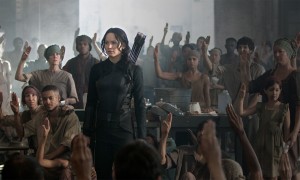 By Richard Crouse – Metro Canada
By Richard Crouse – Metro Canada
Since the release of the first Hunger Games novel in 2008, literary sleuths have picked it apart, searching for connections to other books and films.
The scrutiny increased when the first film in the tetralogy set records for the biggest opening weekend for a non-sequel in 2012, and continues unabated with the release of this weekend’s The Hunger Games: Mockingjay, Part 1.
Based on Suzanne Collins’s mega-successful series, the movies are set in a dystopian world ruled by a fascist-style president (Donald Sutherland) who presides over The Hunger Games, a televised battle-to-the-death between 24 young players, two from each of the country’s districts, including Katniss Everdeen (Jennifer Lawrence) and Peeta Mellark (Josh Hutcherson).
The series draws on things we’ve seen before, in everything from the human sacrifices of Greek mythology or Survivor-style television shows to news stories of government corruption to create a world with its own rules, style and customs.
The most often-cited influence is Battle Royale, a 2000 Japanese movie based on a book by Koushun Takami. Like The Hunger Games, it’s a story of school kids in a televised government-sanctioned death match.
Battle Royale’s DVD box set even included a quote from a critic suggesting there’d be no Hunger Games without the Japanese film. “This is the movie that started it all,” it reads.
Hunger fans were quick to point out differences in the two films. The Japanese movie is about survival, they said, while Collins wrote about revolution. The author revealed her main influences were reality television and the Iraq war.
“I had never heard of that book or that author until my book was turned in,” she told the New York Times.
It’s worth noting that the idea of humans being preyed upon for the entertainment of the upper classes dates back at least as far as 1932’s The Most Dangerous Game. The story of a big-game hunter who tracks humans for sport on an isolated island is based on a Richard Connell short story that also loosely inspired episodes of everything from Gilligan’s Island to Lost in Space. Since then, Norman Jewison’s Rollerball, Roger Corman’s Deathrace 2000 (and its 2008 Jason Statham remake) and The Running Man have mined similar territory.
As for the author who wrote Battle Royale, he gave ABC News a very diplomatic answer when asked about the similarities between the two stories. “I think every novel has something to offer,” he said. “If readers find value in either book, that’s all an author can ask for.”
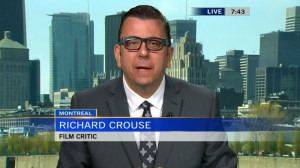 “Canada AM” film critic Richard Crouse gives 3 stars for ‘Lucy’, 2 stars for ‘And So It Goes’, and 2-and-a-half stars for ‘A Most Wanted Man’.
“Canada AM” film critic Richard Crouse gives 3 stars for ‘Lucy’, 2 stars for ‘And So It Goes’, and 2-and-a-half stars for ‘A Most Wanted Man’.
Watch the whole thing HERE!
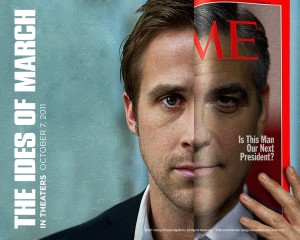 In “The Ides of March,” George Clooney (who also directs) plays a Democratic Party candidate. He’s the kind of guy who would make the top of Bill O’Reilly’s head pop off. He’s pro-ecology, anti-oil. He wants to tax the rich and legalize gay marriage. If he leans any further left he’ll topple over. Although Clooney has spoken out about many of these topics in real life, hasn’t made a left wing fm. Instead he’s made a warts and all political movie.
In “The Ides of March,” George Clooney (who also directs) plays a Democratic Party candidate. He’s the kind of guy who would make the top of Bill O’Reilly’s head pop off. He’s pro-ecology, anti-oil. He wants to tax the rich and legalize gay marriage. If he leans any further left he’ll topple over. Although Clooney has spoken out about many of these topics in real life, hasn’t made a left wing fm. Instead he’s made a warts and all political movie.
The movie focuses its story on Stephen Myers (Ryan Gosling), an idealistic campaign manager who will do anything to win, as long as he truly believes in the candidate. He is devoted to Governor Mike Morris (Clooney), a candidate in the Democratic primary. The first hour is spent getting into the campaign, learning the machinations of a big league primary run, the behind the scenes. Clooney sets up the themes of the piece–loyalty, ethics and the hard edge that comes from playing in the bigs–before taking a right turn–story wise, not ideologically–into different territory.
I’m not going to give away the twist, but it is really then that the movie picks up steam. The first hour is good stuff, great acting from Paul Giamatti, and P.S.H. and a fascinating, if occasionally dry look at life in the political fast lane. Then comes the blackmail, the meetings in darkened stairwells and double crossing journalists.
Gosling impresses as he makes his way from idealism to stark realism, and Clooney looks like he was born to sit in an oval office, but it is the supporting cast who really shine.
Giamatti and Hoffman reek of the backroom. They play opponents but are cut from the same cloth, men who are two steps ahead of everybody else in the room.
“The Ides of March” takes a bit too long to get to the game changing moment, but when the acting is this good, it’s worth the wait.
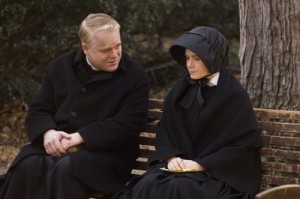 As a Broadway play Doubt ran for over a year, earning four Tony awards, including Best Play and Best Actress. As a film, starring Meryl Streep, Phillip Seymour Hoffman and Amy Adams, it is bound to earn several acting nominations come Oscar time, but I’m afraid it won’t earn awards for directing or Best Picture.
As a Broadway play Doubt ran for over a year, earning four Tony awards, including Best Play and Best Actress. As a film, starring Meryl Streep, Phillip Seymour Hoffman and Amy Adams, it is bound to earn several acting nominations come Oscar time, but I’m afraid it won’t earn awards for directing or Best Picture.
Set in the Bronx in 1964, Doubt centers on a nun, Sister Aloysius Beauvier (Streep), who confronts a priest (Hoffman) after suspecting him abusing the school’s only African-American student (Joseph Foster). Of course he denies the charges and looks to Sister James (Amy Adams) for support.
Doubt starts off slowly. A little too slowly. Director, playwright and screenwriter John Patrick Shanley takes his time establishing a sense of time and place at the expense of the movie’s momentum. We meet the characters: Hoffman’s charming down-to-earth priest, Adams’s naïve nun and Streep’s terrifying nunzilla. Each are introduced and we learn something of their lives and routines, and while some of it is interesting—there is even the odd laugh here and there—the movie doesn’t pick up steam until an hour and a quarter in, but it is worth the wait.
With the introduction of Viola Davis as Mrs. Muller, the frazzled mother of the young boy in question Doubt catches fire. Her showdown with the formidable Sister Aloysius contains some of the best written and best performed dialogue of the year. It’s an unsettling, surprising sequence that raises points about the flexibility of morality in extreme instances. Davis is on screen no more than six or seven minutes but will likely earn an Oscar nod for her work.
From that point on Doubt is one of the most compelling films of the year. Shanely carefully unveils the story to leave both the characters and the audience wondering what is true and what isn’t.
Doubt, like so many films this year, is a movie whose performances are better than the film itself. Hoffman expertly toggles back and forth between Father Flynn’s personality extremes—a controlling nature tempered by a large dollop of charm while Adams is all wide eyed naiveté.
They’re impressive, but Streep steals the show. Her Sister Aloysius is like an onion which reveals itself one layer at a time. When we first meet her she is the stereotypical strict nun, ruling her school by fear. When she calls one boy to the office for a minor infraction Father Flynn comments, “the dragon is hungry today.” She’s an anachronism, a woman whose ordered world is changing too quickly. Unable to keep up she thinks the song Frosty the Snowman espouses pagan beliefs and the ball point pen is a vehicle of change for the worse. “Every easy choice will have a consequence tomorrow.” She’s old school, but under that hard-line exterior is a deeply caring person who will not be pushed around.
When she accuses Father Flynn, her superior in the chain of command, of inappropriate behavior he says, “I can fight you!” “You will lose,” she snaps back, unafraid. It’s powerful stuff, made even more effective by Streep’s performance. The battle scenes between these two, complete with tightly written verbal warfare, are as dynamic and exciting as any action scene I’ve seen in a movie this year.
Doubt is a beautifully performed guessing game, with dynamite dialogue and thought provoking views on morality, religion and authority. It’s hard to believe that the same man who wrote this also penned Joe and the Volcano.
 It is often said that great art comes from adversity. The commentary track on the new DVD of Capote hints that, in fact, the old adage may be true. Director Bennett Miller and star Phillip Seymour Hoffman suggest that their relationship on set in Winnipeg may have been less than amicable. Perhaps it was that tension that drove Phillip Seymour Hoffman to give the best performance of his career as the prickly writer Truman Capote.
It is often said that great art comes from adversity. The commentary track on the new DVD of Capote hints that, in fact, the old adage may be true. Director Bennett Miller and star Phillip Seymour Hoffman suggest that their relationship on set in Winnipeg may have been less than amicable. Perhaps it was that tension that drove Phillip Seymour Hoffman to give the best performance of his career as the prickly writer Truman Capote.
The film chronicles the six years Capote put in doing research for In Cold Blood, a true-crime book about the murder of a Kansas family. It also elaborates on the long-whispered rumours about his relationship with one of the killers, Perry Smith.
Hoffman is letter perfect as the writer, who to many people is best-known as a frequent guest on daytime talk shows in the 70s, and for his high squeaky voice. Capote captures the character before his life fell apart in a miasma of drugs and alcohol, and before he became a self-parody. Hoffman’s performance could easily have fallen into mimicry but is instead a well-hewn portrait of a complicated and troubled man.
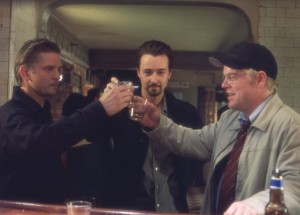 In recent years I have found Spike Lee movies to be very frustrating. Fifty percent of each movie I really like, but then there’s the remaining fifty percent that just infuriates me. It’s not bad filmmaking; it’s just unnecessary filmmaking. There is a lot of stuff in these films that doesn’t further the story, that is preachy, and simply doesn’t belong there. But the stuff that’s good is really, really good, and I found The 25th Hour to be another example of that.
In recent years I have found Spike Lee movies to be very frustrating. Fifty percent of each movie I really like, but then there’s the remaining fifty percent that just infuriates me. It’s not bad filmmaking; it’s just unnecessary filmmaking. There is a lot of stuff in these films that doesn’t further the story, that is preachy, and simply doesn’t belong there. But the stuff that’s good is really, really good, and I found The 25th Hour to be another example of that.
plays small-time drug dealer Montgomery Brogan, who, after being arrested by the DEA, reevaluates his life in his last 24 hours before beginning a seven-year jail term. Interesting premise. Why then muddy it up with a commentary on September 11th that seems out of place, and kind of badly chosen? Exploring the relationship between Brogan and his two best friends, Jacob and Frank (Phillip Seymour-Hoffman and Barry Pepper) and how their friendship will change once Montgomery goes to jail would have been a great character drama.
Instead Lee adds a September 11th angle that feels tacked on and doesn’t add to the movie. Don’t get me wrong, it probably comes from a very sincere place. Spike Lee makes incredible movies about New York and is passionate about the city and probably felt like he had to find a way to tell this story, but he ties the September 11th angle to Montgomery’s story, and in the context of the whole movie I didn’t really understand the connection. If we are supposed to infer that the life New York was changed by the terrorist attacks just as the life of Edward Norton’s character was changed by getting arrested I think it is a weak comparison, and frankly, inappropriate. The dynamic between the three friends is great. I wanted more of that. Loose the September 11th stuff, some of the peripheral story lines and just tell me that story and it would have been a better movie.
25th Hour is classic Spike Lee – brilliant, fearless but at the same time troublesome.